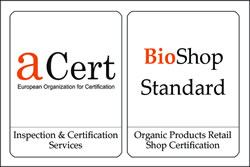a Cert BioShop
 Strengthening the identity of Biological Products Store
Strengthening the identity of Biological Products Store
In recent years a growing number of stores operate in the markets of major cities, offering organic products to consumers. The concern is whether all these products are actually certified and meet the conditions of hygiene and safety so we can put them on our table. a Cert sharing the efforts of the organic retail traders has created a Private Certification Standard for organic product retailers, the a Cert BioShop Standard.
What is a Cert BioShop Standard?
• Sets the shop profile as an organic retail business. The company is not just another store that offers organic products, but operates under a strict framework of a certified organic retail business.
• It sets principles for the implementation of key national requirements for hygiene and food safety.
• Safeguards the retail business and the consumer from misleading product labelling in relation to the organic method of production.
What type of store can apply for an a Cert BioShop Standard?
The standard covers the entire retail business of selling certified organic products (from receipt of a product by the store to selling it to the final consumer).
It concerns all retail outlets of Biological Products other than farmers’ markets and to direct sales from the farm, which meet at a minimum the following conditions:
a) At least 51% of all product retail codes which they carry are certified organic products according to Regulation (EC) 834/2007.
b) The total percentage of non-organic products marketed by the company can not be greater than 49%. These products can be certified integrated management products, fair trade products, PDO, PGI, TSG and other traditional products. Also, non-edible products such as cosmetics, detergents, etc. which contain as main ingredients natural products or are environmentally friendly (concerning both their use and / or their method of preparation) or carry certification according to other standards.
c) The certified organic products displayed in separate locations from those of similar products not bearing an indication of organic production within the premises, in such a way as to ensure that absolutely will not cause confusion to consumers between biological and other similar products.
d) They meet the basic requirements of national legislation on hygiene and food safety (EFET guides).
How is this a Cert BioShop Standard applied by the store?
The company is obliged to keep a system of procedures and records relating to legislation, purchasing products, quantitative management of biological products, maintenance of infrastructure, staff training and management of hygiene.
What is the procedure for registration and certification?
At the request of the company concerned a contract is signed and the company is registered in the system of control and certification of a Cert.
The initial inspection includes full physical inspection of the premises of the registered business, inspection of accounting documentation and monitoring of the measures which the company is committed to take in order to comply with the Certification Rules of a Cert BioShop.
The inspector will perform an audit using a questionnaire and will inform the operator of the outcome of the inspection, providing a copy of the report which was prepared. If nonconformities are detected during the audit , then the company must take corrective actions within a period determined by a Cert in agreement with the company.
Compliance with a Cert BioShop standard includes three types of checkpoints, which the company must maintain in order to be granted the relevant Certificate of Compliance.
Checkpoints are defined as Main (100% compliance), Secondary (90% compliance) and Recommended (a minimum compliance rate is not set ).
After granting certification, a Cert in order to ensure the continued application of the Standard and to assure the compliance of the Certified Company’s activities, it maintains monitoring of the granted certification.
This monitoring includes:
• Regular inspections which are carried out at least once each calendar year.
• Additional inspections which are conducted whenever deemed appropriate by the Agency.
How is a certified store recognized?
a) Certificate of Compliance
The Certificate of Compliance is a document that allows the store to prove to any interested party that it meets the requirements of the private standard a Cert BioShop. It is issued by the Agency to the inspected businesses which have been found to meet successfully the requirements of the Standard and have a valid Private Cooperation Agreement with a Cert.
b) Special Certification Label
The certification label is granted only by a Cert and it can never be reproduced by the company. It can be placed on display in an easily visible place in the shop which the company chooses.
| Α/Α | Title | |
| 1. | Fees for Plant Production | |
| 2. | Fees for Processing |
REGULATION OF CERTIFICATION (ICS-BIO-D1.16)
ANNEX TO THE CERTIFICATION REGULATION (ICS-BIO-D1.44) REGARDING THE CONTROL MEASURES APPLIED IN THIRD COUNTRIES
